|
|
|
|
|
|
|
|
|
|
|
|
|
|
|
|
|
|
|
|
|
|
|
Subsidiaries: |
|
|
|
|
|
|
|
Bison Yard |
|
|
|
|
|
|
|
RR Memorabilia: |
|
|
|
|
|
|
|
|
|
|
|
|
|
|
|
|
|
Utilities: |
|
|
|
|
E-mail

|
|
|
Bison Yard |
|
BISON
Yard is an HO-scale emulation of a former large classification yard of the
same name near Buffalo, N.Y. On the Hilton & Ohio, Bison Yard is located
adjacent to the (imaginary) South Buffalo Junction which serves freight and
passenger traffic, including a station stop for passengers of the interurban
trolley line from the Hilton Module.
The Bison Yard, seen often by this
writer from the windows of New York Central trains in days not only past,
but now gone, no longer exists, having given way to the proliferation of the
nation’s superhighway system and the merger fever and fervor of the
railroads themselves. But our attempt to remember this one-time great
enterprise – albeit in a miniature and condensed form – resulted in a
decision to sacrifice our one-time workshop to obtain the space for building
the yard as a part of the H & O empire. So we used risers about a foot high
to raise the workbench surface level to a height which permitted
constructing the yard and containing it (along with the “Mainline Service &
Interchange Module”) within the large oval which was to circle the room,
providing access to and interchange with these two major facilities. |
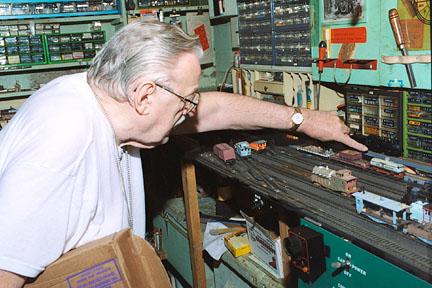
|
Surrounded by parts in cabinets, tools, supplies and HO
maintenance-of-way equipment, Ferroequinologist Norm Wright (the
"iron horse doctor") points out his operating plan for starting
the restoration of Bison Yard on the H & O Division of THE
NORMANED. |
|
So, from the
“Hilton Module,” the restoration work progressed to the workshop room and
the extended layout. |
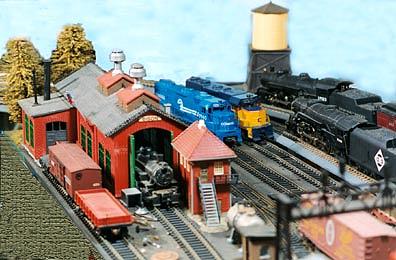 |
|
Left:
Two general purpose GP diesels (Conrail and Chessie System, both
later to become parts of CSX) await on holding tracks near the yard
entrance for their turn to couple up to their assigned consists.
On
the right, a Lehigh Valley passenger train passes by on the main
line, as an Erie RR consolidation waits on an adjacent lead track to
follow. The steam loco in the engine house will remain where it sits
until long-needed repairs are completed. |
|
|
|
Right:
This far-sighted worm's eye view of the west end of Bison Yard
highlights the approach tracks, including a three-way track switch and
other special track arrangements designed to allow traffic in and out of
the yard.
|
 |
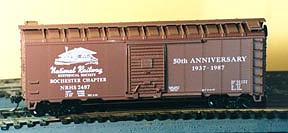
|
Above:
A commemorative boxcar produced in observance of the 50th
anniversary (in 1987) of the Rochester Chapter of the National
Railway Historical Society was photographed on a staging track near
Bison Yard. |
|
|
|
|
Right:
A westbound Baltimore & Ohio Railroad 2-8-8-0 Mallet articulated with a
Vanderbilt tender and a freight consist swings past the caboose holding
area at the west end of Bison Yard. |
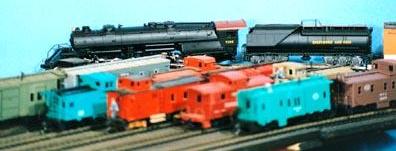 |
|
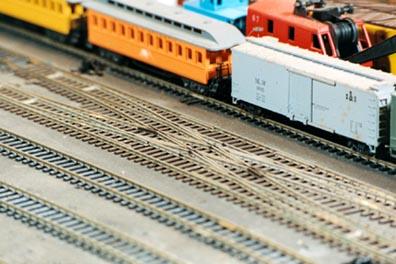 |
Left:
This complex double-crossover switch allows yard switching engines to
shuttle cars around the yard without blocking the approach and departure
tracks while assembling and breaking up consists of cars. |
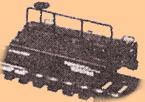 |
|
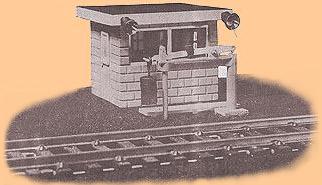 |
A
railroad scale was used on the prototype Bison Yard to weigh cars, such
as those with bulk lading like coal, stone, or grains, for billing
purposes. Although the H & O Bison Yard car scale (left) does not
actually measure anything, it can add the fun of switching cuts of cars
for weighing during operating sessions. Since railroad scales required
calibration about twice a year, scale test cars (above, right),
basically weights on wheels, were used to check them. |
|
|
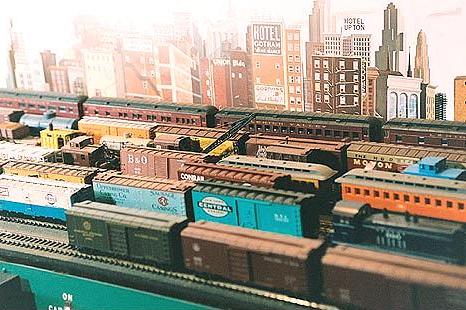
|
Plenty of activity is already evident at Bison Yard as the morning
sun begins to burn through the South Buffalo smog. |
|
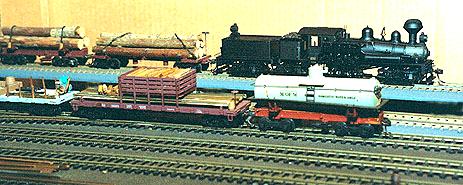
|
The newly-acquired Shay geared locomotive arrives on the upper
level of the Bison Yard of the H & O Division with its first load
of freshly-cut raw lumber from the Adirondack Mountain Region of
New York State. On the lower level, three maintenance-of-way work
supply cars await their trip to wherever they may be needed in the
now ongoing revived model railroad restoration program. |
|
|
| |

|
[ Home ]
|

|
|